Hubert Piatkowski: Student Experiences at Hazelden Betty Ford Centre
20 September 2024
 Hubert Piatkowski is a fourth-year doctor of pharmacy student at the University of Alberta. His early interactions with pharmacists and the care he received during a serious illness in 2019 inspired him to pursue a career in pharmacy.
Hubert Piatkowski is a fourth-year doctor of pharmacy student at the University of Alberta. His early interactions with pharmacists and the care he received during a serious illness in 2019 inspired him to pursue a career in pharmacy.
His summer experience at the Hazelden Betty Ford Foundation & University of Alberta 2024 Substance Use Disorder Immersion Program in Rancho Mirage, California allowed him to participate in group counselling sessions and educational lectures alongside fellow PharmD and MD students, deepening his understanding of substance use disorder.
Piatkowski reflects on his experience at the Betty Ford Center.
Tell us about your experience at the Betty Ford Center.
The program was a fantastic experience. Our days primarily consisted of morning patient group counselling sessions and afternoon educational lectures. At lunch and dinner, we had the opportunity to casually sit in with patients and discuss their experiences with substance use.
At my first group therapy session, I had the chance to share my personal experience about being hesitant to dispense opioids to a patient who I thought was diverting medications. My candour about the situation brought up an interesting discussion with the group therapy patients and I got an intimate view of what patients living with substance use disorder experience. As the days went on, I got to see into the lives of these patients and their struggles living with substance use disorder. My counsellor, who had experienced living with the disorder themselves, employed interesting therapy strategies such as a daily schedule and a fight song, which a patient listens to when they feel like they will use substances again. This song aims to remind a patient of all the important things (family, hobbies, significant others, friends) in their lives impacted by substance use.
What did you learn and what had the greatest impact on you?
I was most impacted by the wide array of people at the Betty Ford Center. I was really surprised to see people of all professions and walks of life, many of whom look no different from you or me. The Betty Ford Center also has a program for children not living with substance use, but processing substance use in their immediate lives (parents, family members); that was both challenging and impactful to see.
I learned that it is essential to remember that when working with a population who has a different life perspective than you, if you do not share that life perspective, you will never truly understand what that population goes through. For this reason, it’s great that the Betty Ford Center employs counsellors and staff living with past substance use disorder. I may be able to apply empathy to the patients that I interacted with, but unless I have gone through their situation, I do not know what it is like to live with the disorder.
How will you apply what you learned to your professional and academic life?
During one of our afternoon lecture sessions, I asked one of the counsellors how to talk about substance use. As a future clinician, I think asking patients how many drinks they have per day or what their recreational drug use is like will have them provide an inaccurate answer — it is scary talking to medical professionals and feeling judged. Instead, the counsellor suggested asking patients if they have had a change in their mood, sleep or lifestyle. If the patient feels uncomfortable discussing further, you can reassure them that you are not there to judge and apply universal precautions such as saying, “I ask this to all my patients.” After the Betty Ford Center, I went back to my summer job at the Peace River Hospital. I applied this tactic when performing the best possible medication histories in the emergency department. I found this strategy to be effective, with a more significant number of patients disclosing their substance use.
Where did you experience the most personal growth through this experience?
My mom is a health-care provider working at a downtown Edmonton clinic. Growing up, I would see unhoused people and witness IV drug use. In my own culture, I see members of my community who live with alcohol use disorder but hide their condition like many of the Betty Ford patients. I think the most prominent form of personal growth that I have experienced is understanding that the patients who have higher social determinants of health have greater resources to mask their substance use. An unhoused individual likely does not have a space where they can hide their substance use, which makes them more visible to the public.
How has this experience impacted you as a future pharmacist?
I became a lot more open-minded. As previously mentioned, I, too, struggle with ethically ambiguous situations surrounding substance use, but at least now I have personal stories from patients to contextualize them. I will take forward empathy, understanding and a great quote from my counsellor: “For most people, the substances are like food and water: they cannot live without them.”